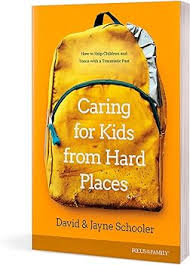
Why doesn't he act his age? Why does she behave so impulsively? Why does he have meltdowns so often?
There is always meaning behind behavior in all of us. It might be a behavioral reaction from something as simple as hunger or exhaustion. Or something far more serious - a triggered reaction to a traumatic, frightening experience.
Children who have experienced early childhood neglect or trauma are often greatly impacted in developmental ways. Children in foster care or who are given up for adoption often deal with these kinds of negative early experiences and it can be difficult to know how to help. People who teach-either in school or children's ministry often see these youngsters' behavior as confusing and don't understand why.
In Caring for Kids from Hard Places, Jayne and David Schooler discuss the reasons behind why children and teens sometimes exhibit potentially disruptive behavior. Together, they offer practical strategies on training, equipping and resourcing staff and volunteers to provide a responsive environment for children with behavioral challenges. Caring for Kids from Hard Places includes:
Insights on how to understand adverse childhood experiences (ACEs)
Principles for creating a trauma-informed environment
Strategies for facilitating healing
Tips on how to create a sensory-smart classroom
Discover how to better love children from difficult backgrounds and pave their way for a better life.
There is always meaning behind behavior in all of us. It might be a behavioral reaction from something as simple as hunger or exhaustion. Or something far more serious - a triggered reaction to a traumatic, frightening experience.
Children who have experienced early childhood neglect or trauma are often greatly impacted in developmental ways. Children in foster care or who are given up for adoption often deal with these kinds of negative early experiences and it can be difficult to know how to help. People who teach-either in school or children's ministry often see these youngsters' behavior as confusing and don't understand why.
In Caring for Kids from Hard Places, Jayne and David Schooler discuss the reasons behind why children and teens sometimes exhibit potentially disruptive behavior. Together, they offer practical strategies on training, equipping and resourcing staff and volunteers to provide a responsive environment for children with behavioral challenges. Caring for Kids from Hard Places includes:
Insights on how to understand adverse childhood experiences (ACEs)
Principles for creating a trauma-informed environment
Strategies for facilitating healing
Tips on how to create a sensory-smart classroom
Discover how to better love children from difficult backgrounds and pave their way for a better life.



